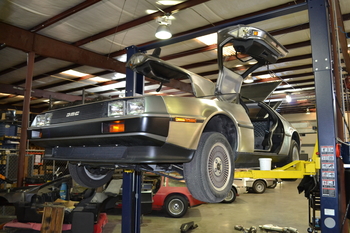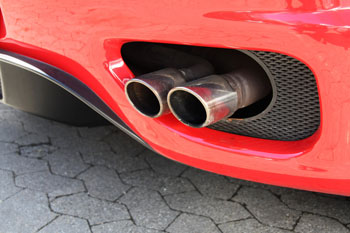SEMA News—May 2020
LEGISLATIVE AND TECHNICAL AFFAIRS
By Stuart Gosswein
FEDERAL UPDATE
 Replica Cars: SEMA and many other companies and organizations submitted comments on a proposed rule issued by the National Highway Traffic Safety Administration (NHTSA) to implement the Low Volume Vehicle Manufacturers Act. The law allows small automakers to sell up to 325 turnkey replica vehicles that appear to have been produced at least 25 years ago. The 2015 law adopts the kit-car model, whereby the cars are regulated as equipment rather than current model-year vehicles. SEMA sued NHTSA in October 2019 for failure to issue a rulemaking within one year as required under the law. The agency responded to a court deadline by issuing the proposed rule. NHTSA is now reviewing public comments. Although there is no deadline, SEMA is urging NHTSA to issue a final rule by the summer of 2020 so that companies can begin producing and selling replica vehicles. |
RPM Act: Congressional support for the Recognizing the Protection of Motorsports Act (RPM Act), H.R. 5434/S. 2602, continues to grow. The bill was reintroduced in the U.S. Senate and House of Representatives in 2019, and SEMA is working with lawmakers to pass the bill in 2020. The bill sponsors are Senators Richard Burr (R-NC) and Joe Manchin (D-WV) and Representatives Patrick McHenry (R-NC) with Rep. Raul Ruiz (D-CA). There were 29 co-sponsors in the Senate and 53 co-sponsors in the House at the time of this publication. The bipartisan RPM Act protects the right to convert an automobile into a race car used exclusively at the track and to sell parts used to make the conversion and race the vehicle. SEMA asks its members to contact their lawmakers and urge their support. Visit www.sema.org/rpm for more information.
Steel and Aluminum Tariffs: As of February 8, 2020, imported bumper stampings for motor vehicles and other finished products are now subject to 25% steel tariffs and 10% aluminum tariffs. Until that time, the tariffs were applied only to processed raw materials (steel/aluminum plate, sheets, bars, etc.), not finished products (wheels, exhausts, etc.). The metal tariffs were first imposed in March 2018, based on a finding that a global over-supply had depressed prices and posed a national security threat to U.S. domestic production. The Trump Administration’s goal is to boost domestic steel production to 80% capacity levels and to stabilize aluminum production. Over the past two years, the administration documented a dramatic increase in the volume of certain finished products that could be construed as circumventing the tariffs. Besides bumpers, other products subject to tariffs include nails, staples and electrical wire. Other products may be added to the list in future months. Several countries are exempted from the tariffs based on quotas and trade agreements, including Argentina, Australia, Canada and Mexico for the aluminum tariffs, and Argentina, Australia, Brazil, Canada, Mexico and South Korea for the steel tariffs.
Wilderness Legislation: The U.S. House of Representatives passed a bill to restrict access to nearly 2.5 million acres of land in three western states, including the designation of more than 1.4 million acres as wilderness. The Protecting America’s Wilderness Act has been sent to the U.S. Senate, which is unlikely to consider the bill, given strong Republican opposition and a White House veto threat. The bill would set aside more than 600,000 acres in Colorado, 130,000 acres in Washington, and more than 630,000 acres in California as wilderness, a designation that prohibits the use of motorized vehicles, bicycles or other mechanized equipment. In certain areas in California, the bill would require improvements to existing motorized and nonmotorized trails. The U.S. Forest Service would be directed to consider a new trail for motorized off-road vehicles less than 50 in. wide to connect the Ballinger Canyon trail system with a nearby highway. The bill would expand the San Gabriel Mountains National Monument by more than 109,000 acres, creating a San Gabriel National Recreation Area.
STATE UPDATE
 Vermont—Exhaust Noise: The Vermont House of Representatives introduced SEMA-model legislation to create a fair testing procedure for vehicle owners accused of exhaust-noise violations. The bill implements the Society of Automotive Engineers standards for testing of exhaust-noise levels. Under the legislation, a vehicle cannot be in violation of the 95-decibel exhaust noise limit unless it has been tested under those objective standards. The bill awaits consideration in the House Transportation Committee. |
Iowa—License Plates: The Iowa House of Representatives introduced SEMA-supported legislation to allow all motor vehicles to display a single license plate on the rear of the vehicle. Current law permits the display of only a single plate for vehicles that are model-year ’48 or older, as well as reconstructed or specially constructed vehicles built to resemble vehicles that are model-year ’48 or older. The bill awaits consideration in the House Transportation Committee.
Kansas—Historic Vehicles: The Kansas House of Representatives introduced SEMA-supported legislation to redefine vehicles eligible to be registered as antiques. The Kansas Highway Patrol currently defines an antique vehicle as being more than 35 years old and as close to the original as possible, without any significant alterations to the major component parts. The bill would require only that the vehicle be more than 35 years old, regardless of the age or type of equipment installed, thereby allowing the use of non-original materials. The bill awaits consideration in the House Transportation Committee.
Kansas—Military Vehicles: The Kansas House of Representatives passed SEMA-supported legislation allowing for the registration and on-road use of surplus military vehicles. Currently, only antique military vehicles more than 35 years old can be registered for road use. The bill awaits consideration in the Senate Transportation Committee.
Maryland—Historic Vehicles: The Maryland House of Delegates introduced SEMA-opposed legislation to impose an emissions inspection requirement on historic vehicles less than 40 years old. All historic vehicles are currently exempt. In Maryland, a historic vehicle is defined as being 20 years old or older and not substantially altered from the manufacturer’s original design. The bill awaits consideration in the House Environment and Transportation Committee.
Maryland—License Plates: The Maryland House of Delegates introduced SEMA-supported legislation to require the display of a single, rear-mounted registration plate for all classes of vehicles. Under current law, vehicles must display two license plates. The bill would take effect October 1, 2020. The bill awaits consideration in the House Environment and Transportation Committee.
Maryland—Military Vehicles: The Maryland House of Delegates introduced SEMA-model legislation to allow for the registration of military surplus vehicles. This SEMA-supported bill creates a one-time registration fee of $51 for those vehicles, which include all wheeled, multipurpose vehicles that were manufactured for use in the United States or another country’s armed forces and authorized for sale to civilians. A military surplus vehicle currently registered under a different registration class prior to the bill going into effect may continue to be registered under that class. The bill awaits consideration in the House Judiciary Committee.
Michigan—Military Vehicles: The Michigan Senate passed a group of SEMA-supported bills allowing for the titling and registration of military surplus and historic military surplus vehicles. Such vehicles are currently not able to be titled or registered for use on highways in the state. The bills await consideration in the House Transportation Committee.
Oklahoma—License Plates: The Oklahoma House of Representatives introduced SEMA-opposed legislation to require front and rear license plates on all vehicles. Vehicles are currently required to display only a single, rear-mounted license plate. The bill awaits consideration in the House Appropriations and Budget Committee.
Vermont—License Plates: The Vermont House of Representatives introduced SEMA-supported legislation to require the display of only a single, rear-mounted license plate for all passenger cars and trucks with a registered weight of 10,000 lbs. or less. Under current law, vehicles must display two license plates. If passed, the bill would take effect July 1, 2020. The bill awaits consideration in the House Transportation Committee.
Virginia—Motorsports: The Virginia Senate passed SEMA-supported legislation to create a motor-vehicle racing heritage trail in order to promote tourism and economic development. The bill awaits consideration in the House Committee on General Laws.
Washington—Vehicle Registration: The Washington Senate passed SEMA-opposed legislation to significantly restrict the eligibility of collector vehicles and horseless carriages. Under existing law, a collector vehicle must be at least 30 years old, while a horseless carriage must be at least 40 years old. If the bill is passed, collector vehicles would be required to be at least 40 years old, while horseless carriages would be defined as being manufactured prior to 1916. It would also restrict the issuance of year-of-manufacture plates and considerably increase registration fees. The legislation awaits consideration in the House Transportation Committee.
West Virginia—Military Vehicles: The West Virginia House of Delegates passed a SEMA-supported bill to allow antique military vehicles to display an alternate registration insignia as opposed to a traditional license plate. Antique-vehicle plates are currently available for vehicles that are more than 25 years old and owned solely as collectors’ items. The bill awaits consideration on the Senate floor.
West Virginia—Motorsports: The West Virginia Senate introduced SEMA-supported legislation to aid and incentivize the construction of motorsports complexes. The bill awaits consideration in the Senate Finance Committee.
West Virginia—Outdoor Recreation: The West Virginia Senate introduced SEMA-supported legislation to create an Office of Outdoor Recreation. The bill details the responsibilities of the office, which would coordinate outdoor recreation policy and create an advisory board to ensure stakeholder participation. Seventeen other states have created similar offices to help stimulate outdoor recreation activities. The bill awaits consideration in the Senate Economic Development Committee.
Wisconsin—Collector and Hobbyist Vehicles: The Wisconsin Assembly introduced SEMA-opposed legislation to restrict eligibility and raise fees for collector and hobbyist vehicle registrations. Currently, collector and hobbyist vehicles must be more than 20 years old, and owners are required to pay twice the registration fee as the type of vehicle being registered. If passed, the bill would further limit each designation to vehicles 30 years old and older, expand seasonal-use restrictions, and increase the registration fees to three times the normal rate. A collector vehicle is defined as having historical significance and no body alterations. Vehicles eligible for hobbyist plates include street modifieds, replica vehicles, reconstructed vehicles and homemade vehicles. The bill awaits consideration in the Assembly Committee on Transportation.






